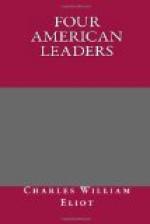I was also interested in studying in this example the quality of prophets in general. We know a good deal about the intellectual ancestors and inspirers of Emerson; and we are sure that he drank deep at many springs of idealism and poetry. Plato, Confucius, Shakespeare, and Milton were of his teachers; Oken, Lamarck, and Lyell lent him their scientific theories; and Channing stirred the residuum which came down to him through his forbears from Luther, Calvin, and Edwards. All these materials he transmuted and moulded into lessons which have his own individual quality and bear his stamp. The precise limits of his individuality are indeterminable, and inquiry into them would be unprofitable. In all probability the case would prove to be much the same with most of the men that the world has named prophets, if we knew as much of their mental history as we know of Emerson’s. With regard to the Semitic prophets and seers, it is reasonable to expect that as Semitic exploration and discovery advance, the world will learn much about the historical and poetical sources of their inspiration. Then the Jewish and Christian peoples may come nearer than they do now to Emerson’s conceptions of inspiration and worship, of the naturalness of revelation and religion, and of the infinite capacities of man. Meantime, it is an indisputable fact that Emerson’s thought has proved to be consonant with the most progressive and fruitful thinking and acting of two generations since his working time. This fact, and the sweetness, fragrance, and loftiness of his spirit, prophesy for him an enduring power in the hearts and lives of spiritually-minded men.



